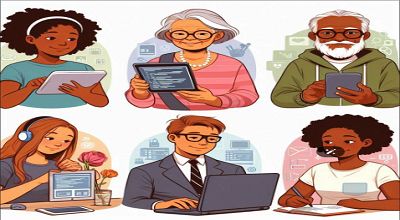Examples of Digital Literacy
Examples of Digital literacy encompass a wide range of skills and knowledge related to the use of digital technologies and the Internet. Here are some examples of digital literacy:
- Basic Computer Skills: Understanding how to use a computer, including tasks like turning it on and off. Using a keyboard and mouse, and navigating the desktop.
- Internet Browsing: The ability to browse the web, search for information using search engines, and navigate websites.
- Email Communication: Proficiency in sending, receiving, and managing emails, including attaching files and understanding email etiquette.
- Social Media: Knowledge of how to use social media platforms. Such as Facebook, Twitter, Instagram, and LinkedIn for personal or professional purposes.
- Online Safety: Awareness of online risks, including identity theft. Phishing scams, and how to protect personal information while using the internet.
- Digital Security: Understanding the importance of antivirus software, firewalls, and safe
More Here…
- Online Research: The ability to find, evaluate, and use information from online sources, including academic, professional, and personal research.
- Cloud Storage and File Management: Familiarity with cloud services like Google Drive or Dropbox for storing and managing digital files.
- Word Processing and Office Software: Proficiency in using word processing software like Microsoft Word. As well as spreadsheet and presentation software (e.g., Microsoft Excel and PowerPoint).
- Multimedia Editing: Basic skills in editing images, videos, and audio files using software like Adobe Photoshop or iMovie.
- Coding and Programming: Understanding the basics of coding and programming languages. Which can include skills in HTML, CSS, JavaScript, and more.
Extra here…
- Online Collaboration: Ability to collaborate with others online using tools like Google Docs, Slack, or project management software.
- Online Privacy: Knowledge of how to protect your online privacy. Including managing privacy settings on social media platforms and understanding data collection practices.
- E-commerce Skills: Understanding how to shop online, make secure online payments, and navigate e-commerce platforms.
- Digital Citizenship: Awareness of responsible and ethical behavior online, including respecting copyright, avoiding cyberbullying, and participating in positive online communities.
- Adaptability: The ability to learn and adapt to new digital tools and technologies as they emerge.
- Critical Thinking: The capacity to assess the credibility and reliability of online information, discerning between reliable and unreliable sources.
- Data Literacy: The ability to interpret and analyze data, as well as understand data visualization techniques.
Final Words
Digital literacy is an evolving concept as technology advances. So staying up-to-date and continuously learning is essential in this digital age. The specific skills needed may vary depending on an individual’s personal and professional goals.
